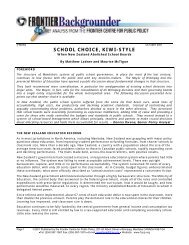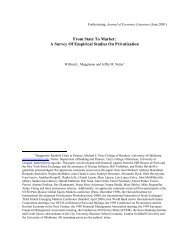POLICYSERIES - Frontier Centre for Public Policy
Create successful ePaper yourself
Turn your PDF publications into a flip-book with our unique Google optimized e-Paper software.
LITTLE CRECHE ON THE PRAIRIES<br />
P O L I C Y S E R I E S<br />
The Prairie Experience<br />
MANITOBA<br />
Manitoba has made child care a priority<br />
area <strong>for</strong> social policy. Between 1992 and<br />
2007 the provincial budget <strong>for</strong> child care<br />
doubled from $42 million to $85 million.<br />
There has also been strong growth in the<br />
number of spaces in the province: from<br />
19,000 spaces in 1992 to 26,000 spaces<br />
in 2007. 1<br />
While the province has made greater<br />
access to regulated child care a policy<br />
concern, it has also established a distinctive<br />
ideological agenda that favours nonprofit<br />
operators.<br />
All non-profit child care centres in the<br />
province are eligible <strong>for</strong> operating grants<br />
that can be worth $8,300 per year per<br />
space depending on the age category.<br />
For-profit centres cannot apply <strong>for</strong><br />
these funds, and only <strong>for</strong>-profit centres<br />
established be<strong>for</strong>e 1991 can receive certain<br />
fee supports. 2 For-profit centres are also<br />
ineligible <strong>for</strong> transportation subsidies,<br />
start-up grants and grants <strong>for</strong> children with<br />
disabilities.<br />
This policy creates a significant disincentive<br />
<strong>for</strong> any potential new <strong>for</strong>-profit daycare<br />
operator. Not surprisingly, the percentage<br />
of <strong>for</strong>-profit daycares has fallen from 13<br />
percent in 1998 to five percent today. If<br />
this policy continues, it seems inevitable<br />
the <strong>for</strong>-profit component of Manitoba’s child<br />
care sector will continue to shrink; and<br />
eventually disappear. 3<br />
How to open ten new daycares in Manitoba<br />
6<br />
For Paul Feldvari, the term <strong>for</strong>-profit<br />
daycare is something of a misnomer.<br />
“I consider myself to be a private day-care<br />
operator,” he says. “But there’s no profit<br />
in it.”<br />
Feldvari runs one of the few commercial<br />
child care centres in Manitoba. And while<br />
government policy has deliberately made<br />
life difficult <strong>for</strong> entrepreneurs such as<br />
Feldvari, he provides a valuable service<br />
<strong>for</strong> Winnipeg parents and their children.<br />
In fact, his ef<strong>for</strong>t often outshines his nonprofit<br />
competition.<br />
Feldvari’s 53-space Double Trouble Daycare<br />
in Winnipeg’s Seven Oaks neighbourhood<br />
has been operating since 2001. While he<br />
can accept children receiving monthly child<br />
care subsidies, he is ineligible to receive a<br />
wide variety of other subsidies and grants<br />
the government makes available to nonprofit<br />
centres.<br />
A provincial operating grant program<br />
provides up to $8,300 per space per year<br />
to non-profit centres. Feldvari can’t even<br />
apply. And while children in after-school<br />
care at neighbouring non-profit centres<br />
receive free bus transportation from<br />
school, Feldvari’s parents have to pay<br />
extra <strong>for</strong> this privilege.<br />
This funding inequity means Feldvari earns<br />
less than most administrators working in<br />
non-profit daycares. “Most of what I make<br />
I roll back into the operation,” he says.<br />
Feldvari relies on an art studio he owns to<br />
help pay his bills; the daycare is a labour<br />
of love. Such an attitude seems entirely at<br />
FCPP POLICY SERIES NO. 58 • MAY 2009<br />
© 20O8<br />
FRONTIER CENTRE


















